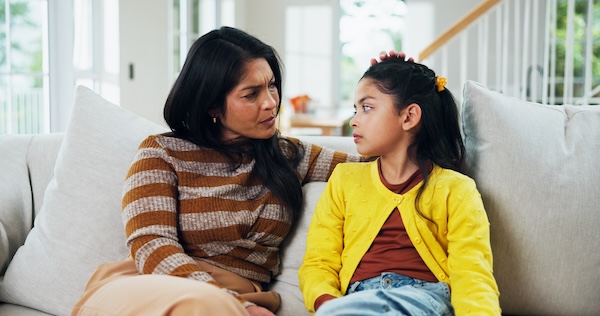Drag
Select
Call Now
Signs of OCD in kids, teens, and young adults
Parent
Kid
Teen

Have you noticed that you or your child feel driven to repeat certain behaviors or rituals, like handwashing or repeatedly checking locks because of distressing or intrusive thoughts? Are you or someone you love experiencing unwanted thoughts that are impacting how they feel and function? Rest assured that you’re not alone in facing these challenges, and help is available so that you can begin to feel your best.
The team at Bend is here to empower you by exploring Obsessive Compulsive Disorder (OCD) and treatment options, so read on for more information and reach out to get an appointment right away if you could use extra support.
What is Obsessive Compulsive Disorder?
Obsessive Compulsive Disorder, or OCD, involves excessive worry or thoughts about something, despite one’s best efforts to stop them. These obsessions may involve unwanted or intrusive thoughts and can lead to feelings of fear, anxiety, or distress. People who experience OCD-related thoughts often refer to things feeling “off” or “not exactly right.”
Those struggling with OCD may have rigid, repetitive rituals, sometimes referred to as compulsions, that they do in order to soothe or eliminate feelings of distress or to prevent feared outcomes. Everyone is different, but rituals can include excessive handwashing, checking to make sure appliances are turned off, checking to make sure doors are locked, or a fixation on orderliness or symmetry. These rituals may have to be done “just right” or else they’ll have to be started all over again.
Experiencing unwanted or repetitive thoughts, participating in self-soothing rituals, or wanting to keep things neat and tidy can be normal parts of life. But experiencing OCD can begin to have an impact on a person’s overall well-being. It can make it difficult to leave the house, participate in activities, focus in school, or get through daily routines. Let’s look at common signs and different types of support surrounding an OCD diagnosis.
What are the signs of OCD in kids, teens, and young adults?
While every young person is different, it’s helpful to get a better understanding of the general symptoms associated with OCD so that you can provide early intervention and receive adequate support.
Remember that exhibiting any of these behaviors does not necessarily mean that a child has OCD. You can use this list as a reference point when talking with a mental health professional. Here are signs and symptoms to look for:
- Repetitive rituals that impact how a person functions, including excessive checking, counting, handwashing, or moving through spaces in a specific way
- Experiencing unwanted, repetitive, rigid thoughts or impulses
- Strong need to adhere to strict routines (e.g. bedtime, getting ready for school)
- Difficulty falling asleep due to intrusive or distressing thoughts
- The intense need for things to feel “just right”; a preoccupation with symmetry, cleanliness, perfection, or tidiness
- Struggles completing homework, leaving the house, or transitioning between daily activities due to obsessions or rituals
- Excessive fears of getting sick, encountering germs or contamination that limit participation in normal activities
OCD can often develop gradually over time, beginning at a young age, and the signs can be difficult to spot. If you or your child is experiencing any of these symptoms, it’s a good idea to reach out to a mental health professional for support.
What are the treatment options for people with OCD?
While OCD can deeply impact young people’s lives, this diagnosis does not mean that you are lacking or beyond help. When approached and treated with powerful tools, insight, and understanding, people with OCD can experience a drastic reduction in symptoms and live full, wonderful lives!
If you suspect that you or your child is experiencing OCD, it’s best to first seek out support from a mental health professional. They will help you to better understand symptoms, treatment options, and reassure you that you don’t have to navigate this alone. Each individual’s OCD journey is different, but some treatment options can include:
- Therapy: Professional treatment may include individual or group cognitive-behavioral therapy (CBT), which can help individuals learn the connection between their thoughts, feelings, and behaviors, while building effective coping techniques. Exposure and response prevention (ERP) is a type of cognitive behavior therapy that gradually exposes a person with OCD to the feared situations or thoughts that are causing anxiety to help them resist the urge to engage in compulsive behaviors.
- Medication: A psychiatrist may prescribe medications that increase levels of serotonin, like selective serotonin reuptake inhibitors (SSRIs).
Seeking support for parents
Parenting a child with OCD can be challenging and isolating, but there are steps you can take to ensure that you feel empowered and supported every step of the way. Here are ways that you seek help:
- Find someone to talk to. Consider reaching out to a mental health professional who can guide you, support you, and help you to feel less alone. You can also look for OCD support groups online or in your area.
- Get informed. Don’t be afraid to ask questions or seek out resources that can help you better understand OCD.
- Call on your community. Are there ways that the people around you can help? Can you ask your partner, family members, or friends to pick up your child from school so that you can have some time to catch your breath? Is there a trusted friend that you can vent to? Can someone grab groceries or prepare a meal for you? Trying to do it all, while navigating an OCD diagnosis, can lead to burnout. Remember that your mental and physical well-being matter so much, so reach out to those around you whenever you can.
We know that this is a lot of information to digest, but the team at Bend is here to help you and your family gain access to the tools, resources, and support that you deserve. Reach out if you’d like to schedule an appointment right away.




